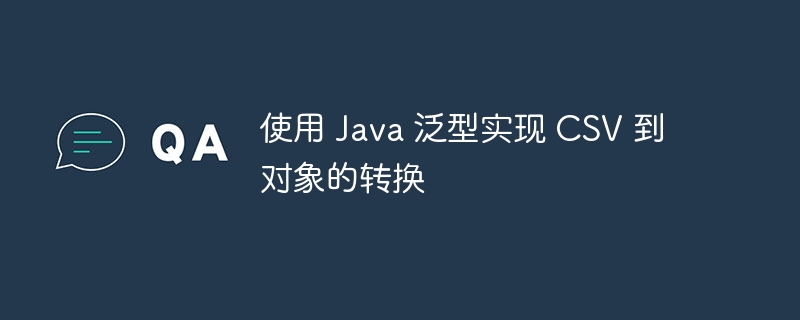Java泛型CSV转对象方法解析
时间:2025-09-13 23:34:46 264浏览 收藏
还在为Java CSV数据转换烦恼吗?本文教你如何利用**Java泛型**构建一个通用的CSV转换器,轻松将CSV文件数据动态转换为各种Java对象,例如Cat和Dog。告别重复代码,显著提升代码复用性和可维护性。同时,强烈推荐使用如Apache Commons CSV等现有的CSV解析库,简化开发流程,增强代码的健壮性,避免手动解析的繁琐与潜在问题。掌握此方法,让你的Java开发更高效!本文还提供了使用Apache Commons CSV的示例,助你快速上手。

本文介绍了如何使用 Java 泛型创建一个通用的 CSV 文件转换器,将 CSV 文件中的数据动态地转换为不同类型的 Java 对象,例如 Cat 和 Dog。 通过使用泛型,避免了为每种对象类型编写重复代码,提高了代码的可重用性和可维护性。 同时,推荐使用现有的 CSV 解析库,以简化开发并提高代码的健壮性。
使用 Java 泛型构建通用的 CSV 转换器
在 Java 开发中,经常需要将 CSV 文件中的数据转换为 Java 对象。 如果针对每种对象类型都编写一个特定的转换方法,会导致代码冗余且难以维护。 利用 Java 泛型,可以创建一个通用的 CSV 转换器,能够动态地将 CSV 数据转换为不同类型的 Java 对象。
1. 创建泛型 CSV 工具类
首先,创建一个泛型类 CsvUtils,使用类型参数 T 表示要转换成的 Java 对象类型。
public class CsvUtils<T> {
public List<T> read(final String fileName, final Class<T> clazz) throws IOException {
List<T> objectList = new ArrayList<>();
Path pathToFile = Paths.get(fileName);
try (BufferedReader br = Files.newBufferedReader(pathToFile)) {
String line = br.readLine(); // Skip header line
while ((line = br.readLine()) != null) {
String[] attributes = line.split(",");
T obj = createObject(attributes, clazz);
if (obj != null) {
objectList.add(obj);
}
}
} catch (IOException e) {
e.printStackTrace();
}
return objectList;
}
private T createObject(String[] attributes, Class<T> clazz) {
try {
T obj = clazz.getDeclaredConstructor().newInstance();
// Assuming the attributes order matches the fields order in the class
Field[] fields = clazz.getDeclaredFields();
for (int i = 0; i < fields.length && i < attributes.length; i++) {
fields[i].setAccessible(true); // Allow access to private fields
// Attempt to convert the string value to the field's type
try {
if (fields[i].getType() == int.class || fields[i].getType() == Integer.class) {
fields[i].set(obj, Integer.parseInt(attributes[i]));
} else if (fields[i].getType() == String.class) {
fields[i].set(obj, attributes[i]);
} // Add more type conversions as needed
} catch (NumberFormatException e) {
System.err.println("Error converting value for field " + fields[i].getName() + ": " + e.getMessage());
}
}
return obj;
} catch (Exception e) {
System.err.println("Error creating object of type " + clazz.getName() + ": " + e.getMessage());
return null;
}
}
}2. 使用泛型 CSV 工具类
现在,可以使用 CsvUtils 类将 CSV 文件转换为 Cat 或 Dog 对象列表。
public class Example {
public void doSomeStuffWithMyDogs() throws IOException {
CsvUtils<Dog> csvUtils = new CsvUtils<>();
List<Dog> myDogs = csvUtils.read("MyDogs_V1.csv", Dog.class);
// do something else with myDogs
for (Dog dog : myDogs) {
System.out.println(dog);
}
}
public void doSomeStuffWithMyCats() throws IOException {
CsvUtils<Cat> csvUtils = new CsvUtils<>();
List<Cat> myCats = csvUtils.read("MyCats_V1.csv", Cat.class);
// do something else with myCats
for (Cat cat : myCats) {
System.out.println(cat);
}
}
}3. 注意事项和改进
- 异常处理: 在实际应用中,需要更完善的异常处理机制,例如记录错误日志、提供友好的错误提示等。
- 类型转换: createObject 方法中需要根据实际情况添加更多的类型转换逻辑,例如日期、布尔值等。
- CSV 解析库: 不建议手动解析 CSV 文件,推荐使用现有的 CSV 解析库,例如 Apache Commons CSV, OpenCSV, SimpleFlatMapper CSV parser, jackson-dataformat-csv, uniVocity-parsers, deephaven-csv 等。 这些库提供了更强大的功能和更好的性能,可以简化开发并提高代码的健壮性。
- 对象创建: createObject 方法使用反射来创建对象,这可能会影响性能。 可以考虑使用工厂模式或构建器模式来创建对象。
- 字段映射: 当前的实现假设 CSV 文件的列顺序与 Java 对象的字段顺序一致。 如果不一致,需要添加字段映射的逻辑。
4. 使用 Apache Commons CSV 示例
以下示例展示了如何使用 Apache Commons CSV 库来解析 CSV 文件。
首先,添加 Apache Commons CSV 的依赖:
<dependency>
<groupId>org.apache.commons</groupId>
<artifactId>commons-csv</artifactId>
<version>1.9.0</version>
</dependency>然后,修改 CsvUtils 类:
import org.apache.commons.csv.*;
public class CsvUtils<T> {
public List<T> read(final String fileName, final Class<T> clazz) throws IOException {
List<T> objectList = new ArrayList<>();
Path pathToFile = Paths.get(fileName);
try (BufferedReader br = Files.newBufferedReader(pathToFile);
CSVParser parser = CSVFormat.DEFAULT.withFirstRecordAsHeader().parse(br)) {
for (CSVRecord record : parser) {
T obj = createObject(record, clazz);
if (obj != null) {
objectList.add(obj);
}
}
} catch (IOException e) {
e.printStackTrace();
}
return objectList;
}
private T createObject(CSVRecord record, Class<T> clazz) {
try {
T obj = clazz.getDeclaredConstructor().newInstance();
Field[] fields = clazz.getDeclaredFields();
for (Field field : fields) {
field.setAccessible(true);
String columnName = field.getName(); // Assuming column name matches field name
String value = record.get(columnName);
try {
if (field.getType() == int.class || field.getType() == Integer.class) {
field.set(obj, Integer.parseInt(value));
} else if (field.getType() == String.class) {
field.set(obj, value);
} // Add more type conversions as needed
} catch (NumberFormatException e) {
System.err.println("Error converting value for field " + field.getName() + ": " + e.getMessage());
} catch (IllegalArgumentException e) {
System.err.println("Column not found: " + columnName);
}
}
return obj;
} catch (Exception e) {
System.err.println("Error creating object of type " + clazz.getName() + ": " + e.getMessage());
return null;
}
}
}这个示例使用了 CSVFormat.DEFAULT.withFirstRecordAsHeader() 来指定 CSV 文件的第一行是标题行,并使用 record.get(columnName) 来获取指定列的值。
5. 总结
使用 Java 泛型可以创建通用的 CSV 转换器,避免为每种对象类型编写重复代码。 为了简化开发并提高代码的健壮性,推荐使用现有的 CSV 解析库。 同时,需要注意异常处理、类型转换、对象创建和字段映射等方面的问题。
终于介绍完啦!小伙伴们,这篇关于《Java泛型CSV转对象方法解析》的介绍应该让你收获多多了吧!欢迎大家收藏或分享给更多需要学习的朋友吧~golang学习网公众号也会发布文章相关知识,快来关注吧!
-
501 收藏
-
501 收藏
-
501 收藏
-
501 收藏
-
501 收藏
-
365 收藏
-
125 收藏
-
372 收藏
-
411 收藏
-
355 收藏
-
482 收藏
-
114 收藏
-
333 收藏
-
288 收藏
-
129 收藏
-
221 收藏
-
299 收藏
-

- 前端进阶之JavaScript设计模式
- 设计模式是开发人员在软件开发过程中面临一般问题时的解决方案,代表了最佳的实践。本课程的主打内容包括JS常见设计模式以及具体应用场景,打造一站式知识长龙服务,适合有JS基础的同学学习。
- 立即学习 543次学习
-

- GO语言核心编程课程
- 本课程采用真实案例,全面具体可落地,从理论到实践,一步一步将GO核心编程技术、编程思想、底层实现融会贯通,使学习者贴近时代脉搏,做IT互联网时代的弄潮儿。
- 立即学习 516次学习
-

- 简单聊聊mysql8与网络通信
- 如有问题加微信:Le-studyg;在课程中,我们将首先介绍MySQL8的新特性,包括性能优化、安全增强、新数据类型等,帮助学生快速熟悉MySQL8的最新功能。接着,我们将深入解析MySQL的网络通信机制,包括协议、连接管理、数据传输等,让
- 立即学习 500次学习
-

- JavaScript正则表达式基础与实战
- 在任何一门编程语言中,正则表达式,都是一项重要的知识,它提供了高效的字符串匹配与捕获机制,可以极大的简化程序设计。
- 立即学习 487次学习
-

- 从零制作响应式网站—Grid布局
- 本系列教程将展示从零制作一个假想的网络科技公司官网,分为导航,轮播,关于我们,成功案例,服务流程,团队介绍,数据部分,公司动态,底部信息等内容区块。网站整体采用CSSGrid布局,支持响应式,有流畅过渡和展现动画。
- 立即学习 485次学习
